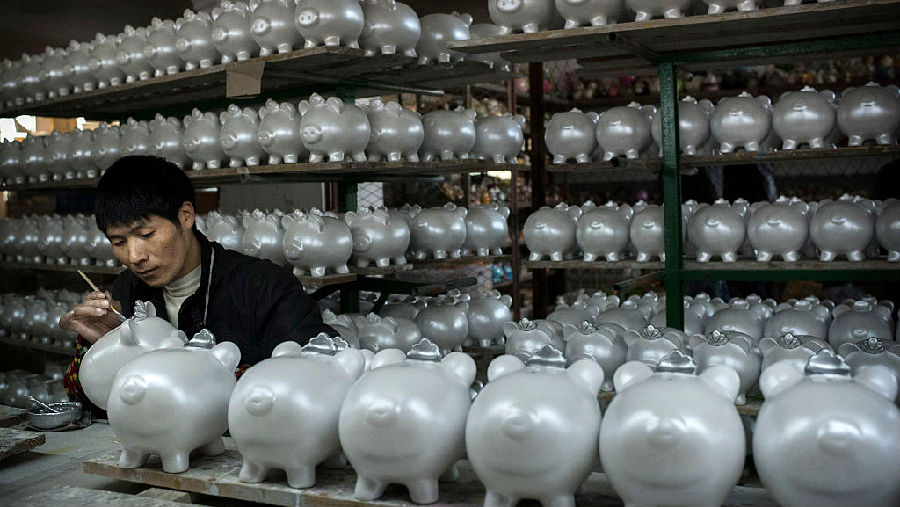ChinaРђЎs official gauge of manufacturing activity for February suffered its largest drop since 2011, an unexpectedly sharp slowdown that left it near the zero-growth level.
2ТюѕС╗й№╝їСИГтЏйт«ўТќ╣УААжЄЈтѕХжђаСИџТ┤╗тіеуџёТїЄТЋ░тЄ║уј░2011т╣┤С╗ЦТЮЦТюђтцДт╣Ёт║дуџёСИІжЎЇ№╝їтѕХжђаСИџТ┤╗тіеуџёТћЙу╝Њт╣Ёт║дС╣ІтцДтЄ║С╣јС║║С╗гуџёТёЈТќЎ№╝їтЁХТЅЕт╝аУ┐ЉС╣јСИ║жЏХсђѓ
The manufacturing purchasing managersРђЎ index published by ChinaРђЎs National Bureau of Statistics fell to 50.3, down a point from January and the largest fall in more than six years. The fall marked the gaugeРђЎs nearest brush with the 50-point mark that separates growth from contraction since August 2016.
СИГтЏйтЏйт«Ху╗ЪУ«Ат▒ђтЁгтИЃуџётѕХжђаСИџжЄЄУ┤Гу╗ЈуљєС║║ТїЄТЋ░(PMI)жЎЇУЄ│50.3%№╝їТ»ћ1ТюѕС╗йСйјС║є1СИфуЎЙтѕєуѓ╣№╝їжЎЇт╣ЁСИ║6т╣┤тцџТЮЦТюђтцДсђѓТГцТгАСИІжЎЇТў»У»ЦТїЄТЋ░УЄф2016т╣┤8ТюѕС╗ЦТЮЦТюђТјЦУ┐Љ50%Тъ»УЇБу║┐уџёСИђТгАсђѓ
A median forecast from economists polled by Reuters had predicted only a fractional slowdown: none of the 28 forecasts for February had pencilled in a reading below 51 for the gauge, which is based on a survey of larger and predominantly state-run companies.
Уи»жђЈуцЙ(Reuters)У░ЃТЪЦуџёу╗ЈТхјтГдт«Ху╗ЎтЄ║уџёжбёТхІСИГтђ╝Тў»№╝їУ»ЦТїЄТЋ░тЈфС╝џт░Јт╣ЁСИІжЎЇсђѓтюет»╣2ТюѕС╗йтѕХжђаСИџPMIуџё28СИфжбёТхІтйЊСИГ№╝їТ▓АТюЅСИђСИфУ«цСИ║У»ЦТїЄТЋ░С╝џСйјС║ј51%сђѓУ»ЦТїЄТЋ░Тў»тЪ║С║јт»╣тцДСИГтъІСИћСИ╗УдЂСИ║тЏйТюЅуџёС╝ЂСИџуџёУ░ЃТЪЦтЙЌтЄ║уџёсђѓ
ChinaРђЎs statistics bureau on Wednesday attributed the slowdown to the lunar new year holiday, when migrant workers return to their home villages and output typically dips. In 2017 the holiday stretched from the end of January through early February, while this yearРђЎs holiday fell entirely in February, making for an unfavourable comparison.
тЉеСИЅ№╝їСИГтЏйтЏйт«Ху╗ЪУ«Ат▒ђт░єТГцТгАСИІжЎЇтйњтЏаС║јТўЦУіѓтЂЄТюЪ№╝їтЁХжЌ┤тцќтЄ║тіАтиЦС║║тЉўУ┐ћС╣АсђЂС║ДтЄ║СИђУѕгжЃйС╝џСИІжЎЇсђѓ2017т╣┤уџёТўЦУіѓтЂЄТюЪТў»С╗ј1Тюѕт║Ћтѕ░2ТюѕтѕЮ№╝їУђїС╗іт╣┤уџётЂЄТюЪт«їтЁеУљйтюе2ТюѕС╗й№╝їСИЇтѕЕС║јТ»ћУЙЃсђѓ
However, the downward move was outsized for the usually incremental series, making it the sharpest fall since a 1.4 point drop in late 2011 that pushed the gauge into contractionary territory.
Сйєт»╣У┐ЉТЮЦСИђУѕгжЃйтюежђљТГЦСИітЇЄуџёУ»ЦТїЄТЋ░ТЮЦУ»┤№╝їТГцТгАСИІжЎЇуџёт╣Ёт║дт«ътюетцфтцД№╝їжЎЇт╣ЁТў»УЄф2011т╣┤т║ЋС╗ЦТЮЦТюђтцДуџёсђѓ2011т╣┤т║ЋТЌХУ»ЦТїЄТЋ░СИІжЎЇС║є1.4СИфуЎЙтѕєуѓ╣№╝їжЎЇтЁЦУЇБТъ»у║┐СИІТќ╣сђѓ

РђюThe lower PMI readings for February may be partly due to Chinese new year, since seasonal adjustments may not fully iron out the impact in year-to-year shifts in the timing of the holiday,РђЮ said Julian Evans-Pritchard, senior China economist at Capital Economics. РђюBut even if we account for such volatility by averaging across the first two months of the year, the data still point to a clear slowdown in early 2018.РђЮ
тЄ»ТіЋт«ЈУДѓ(Capital Economics)жФўу║ДСИГтЏйу╗ЈТхјтГдт«ХТю▒тѕЕт«Ѕ?тЪЃТќЄТќ»-ТЎ«жЄїТЪЦтЙи(Julian Evans-Pritchard)УАеуц║№╝џРђюТўЦУіѓтЈ»УЃйТў»2ТюѕС╗йPMIУ»╗ТЋ░Ух░СйјуџёжЃетѕєтјЪтЏа№╝їтЏаСИ║тГБУіѓТђДУ░ЃТЋ┤тЈ»УЃйТЌаТ│Ћт«їтЁеуєет╣│ТўЦУіѓтЂЄТюЪТЌХжЌ┤уѓ╣уџёт╣┤т║дтЈўтїќтИдТЮЦуџётй▒тЊЇсђѓСйєТў»№╝їтЇ│Сй┐ТѕЉС╗гжђџУ┐ЄТ▒ѓС╗іт╣┤тц┤СИцСИфТюѕуџётЮЄтђ╝ТЮЦУ«АтЁЦУ┐ЎуДЇТ│бтіе№╝їТЋ░ТЇ«С╗ЇТўЙуц║тЄ║2018т╣┤т╝ђт╣┤тЄ║уј░ТўјТўЙТћЙу╝ЊсђѓРђЮ
Betty Wang, senior China economist for ANZ, suggested authoritiesРђЎ crackdown on heavy polluters Рђюalso played an important role in dampening the headline numbers on top of the holiday effectРђЮ. But she added that while the driveРђЎs impact on manufacturing activity would probably last for another couple of months, it was unlikely to have an impact on policy direction.
ТЙ│Тќ░жЊХУАї(ANZ)жФўу║ДСИГтЏйу╗ЈТхјтГдт«ХујІУЋі(Betty Wang)УАеуц║№╝їжЎцС║єтЂЄТюЪуџётй▒тЊЇ№╝їТюЅтЁ│жЃежЌет»╣СИЦжЄЇТ▒АТЪЊС╝ЂСИџуџёТЋ┤жА┐С╣Ът»╣ТјеСйјPMIУхитѕ░С║єжЄЇУдЂСйюућесђѓСйєтЦ╣тљїТЌХУАеуц║№╝їУЎйуёХТЋ┤жА┐СИЙТјфт»╣тѕХжђаСИџТ┤╗тіеуџётй▒тЊЇтЈ»УЃйУ┐ўС╝џтєЇТїЂу╗ГтЄаСИфТюѕ№╝їСйєт«ЃСИЇтЈ»УЃйт»╣Тћ┐уГќТќ╣тљЉС║ДућЪтй▒тЊЇсђѓ













